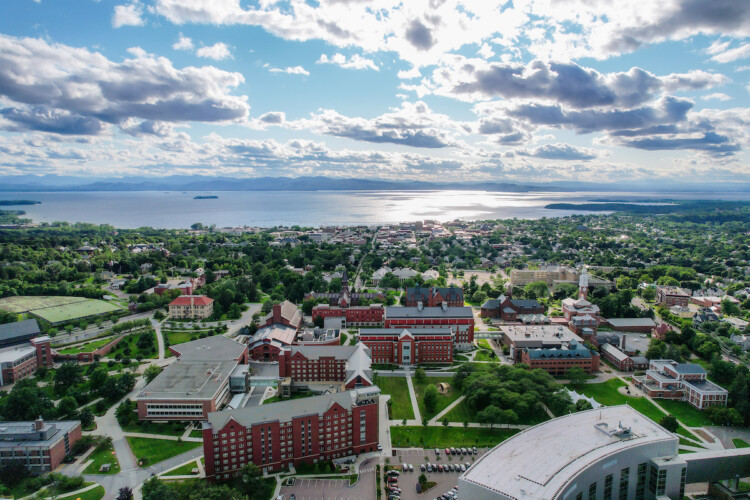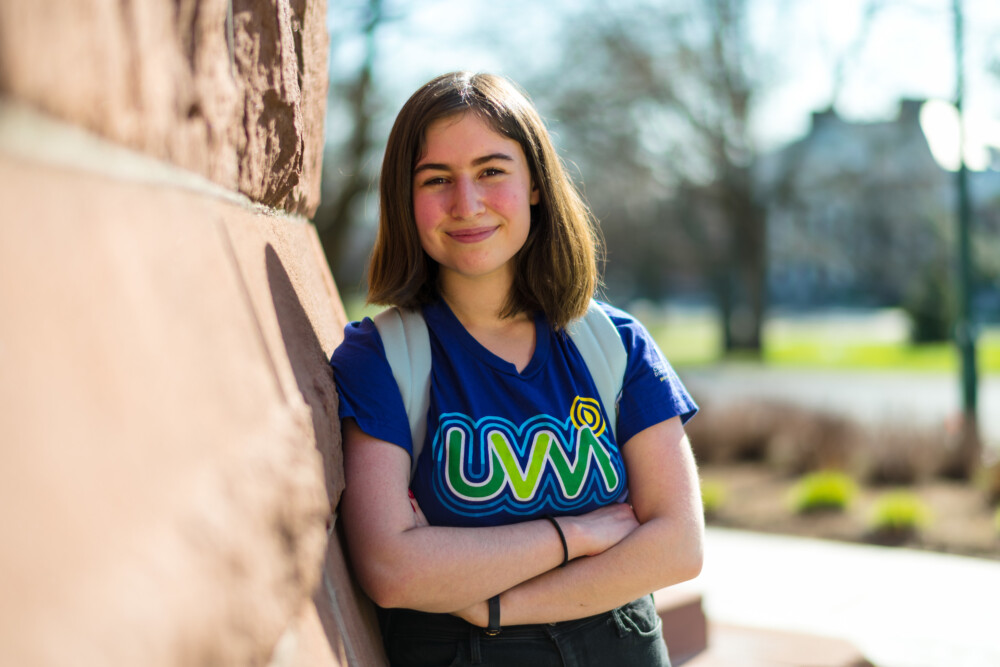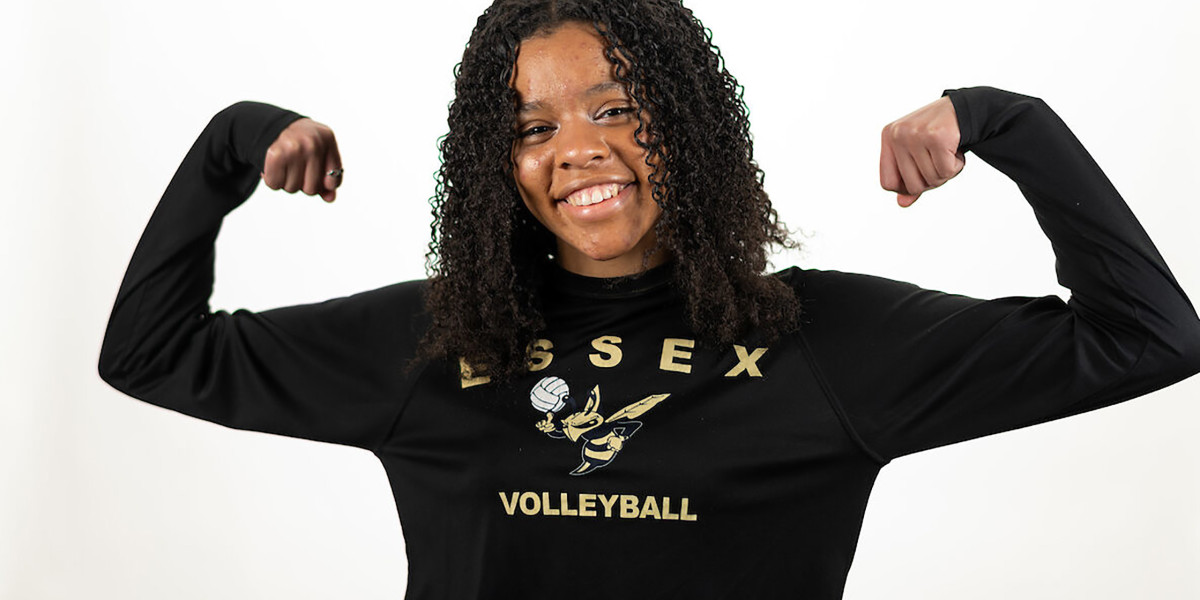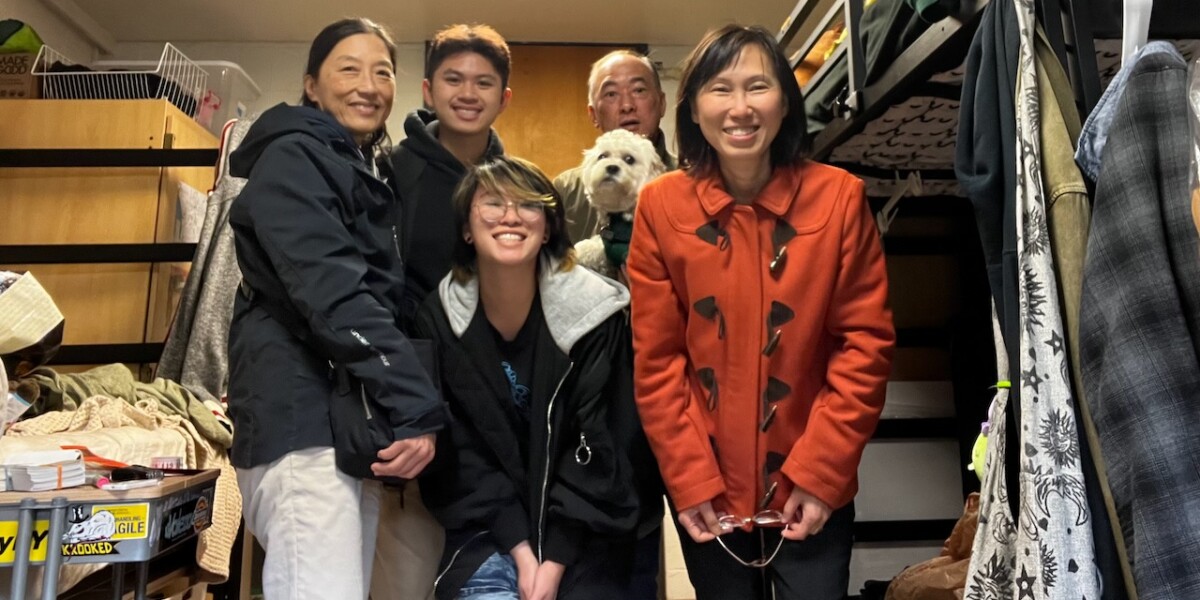Overview
Discover what college is like and earn credits while in high school
Our program offers high school students the incredible opportunity to experience what it’s like to be in college for four weeks during the summer. You’ll study alongside like-minded students, learn from renowned professors, and earn three transferable college credits. Courses offered through Summer Academy are exclusively for pre-college students.
Our leading summer academic program allows you to live on campus while you learn. A commuter option is available for those who do not require on campus housing to participate in the academic program and some courses are offered fully online.

There are so many benefits to Summer Academy. You can:
- Make your college applications stand out to admissions officers.
- Get a feel for what college will be like, and feel more confident going in.
- Earn credits like you would from an AP class, with courses not typically offered in high school.
- Pay discounted tuition rates or learn tuition-free with Vermont dual enrollment vouchers.
- Learn new ideas and perspectives that will help you decide on your major and career path.
What Students Are Saying
“I am so thankful that I had the opportunity to participate in Summer Academy at UVM. By the end of the program, I had met a lovely group of people whom I still keep in contact with, I gained a much clearer understanding of what I want to do, and I feel like I could go to college tomorrow, which I feel puts me ahead of a lot of other students. It was an experience I will absolutely never forget. Now, as a senior, I am applying to UVM as one of my top choices!”
Kate Ciesielski, Health and Medicine
“I would strongly encourage anyone and everyone to attend the UVM Summer Academy if they have a class that meets what they are interested in. It’s a really good experience and I would do it again in a heartbeat.”
Morgan Burnham, Health and Medicine
“It’s a really good experience…to start getting that mentality that this is going to be what is expected of me and I can do this.”
Ayden Carpenter
Admissions
Who can participate in Summer Academy?
Students are ideal for admission if they are academically motivated, curious about college life, and meet the following criteria:
- Have completed 10th, 11th, or 12th grade
- Are at least 15 years old by the start of the program
- Highly-motivated to be challenged by college-level academics
- Interested in experiencing the University of Vermont
- Want to explore a field of study
Students must apply to the program by selecting a course.
Courses & Format
UVM Summer Academy is a 4-week program with 8 days of on-campus instruction followed by two weeks online. One course is offered online only, see the list of courses below.
Course Dates: July 1 – July 26, 2024
On Campus Dates: June 30 – July 12, 2024
- Arrive on campus/check in to residential hall on Sunday, courses begin Monday.
- Checkout is still being finalized, please check back soon.
- Reside on campus two weeks followed by two weeks online.
- Complete all coursework online by date: still being finalized, please check back soon
- Residential enrichment activities are scheduled for the July 4th holiday.
UVM Summer Academy courses are taught by UVM faculty, and students are evaluated by the same academic standards and procedures as UVM undergraduate students. Completed college credit courses will result in an official college grade and will be added to the student’s University of Vermont transcript.
Courses
Whether you’re interested in a high school summer medical program, developing your skills as a writer, or simply exploring a class not offered in high school, our Summer Academy courses will help you prepare for your future.
RESIDENTIAL/COMMUTER
Course Description: Young people entering higher education face a uniquely challenging set of social, economic, and environmental crises, and are eager to find ways to make a difference. At UVM, and in Vermont more broadly, reimagining the food system has become an avenue for meaningful and generative ways to tackle these issues. With an emphasis on community engagement in an academic context, this course introduces students to agroecology – an interdisciplinary approach to agriculture and food systems that works to build healthy, sustainable, and just human and environmental ecosystems. After participating in this course, students will not only have a strong grounding in agroecology and food systems, but also will be uniquely positioned to navigate the UVM landscape, to engage with community partners and organizations, to connect with Vermont as a source of learning, and to explore their role in meaningful social and environmental change.
Directors/Instructor: Thomas Wilson
Course Lab/Materials Fee: TBD
Time: 9:00am-3:30pm
Format: Hybrid
Location: Jeffords 110
Syllabus: Sample Syllabus 7.1.24
RESIDENTIAL/COMMUTER
Description: This course has been designed to introduce students to the field of Medical Laboratory Science. The course combines lecture and laboratory practice, to allow students to demonstrate professionalism and interpersonal skills while achieving competence with common laboratory procedures virtually. As an online course, students will be assigned with lectures and laboratory assignments towards the beginning of the course and will be assigned case studies, that are related to the acquired knowledge, during the latter half of the course. Cases will include case history presented, clinical signs and symptoms, initial and additional laboratory testing and data, relevant test methodologies employed and accurate interpretation of results.
Instructor: Koela Ray, M.S.
Course Lab/Material Fee: $50
Format: Hybrid (On-campus July 1 – July 11 & Online July 15 – July 26)
Location: 237 Hills
Syllabus: HLTH Syllabus for Summer 2024
RESIDENTIAL/COMMUTER
Course Description: As we move deeper into the 21st century, one thing seems certain: the state of the world is uncertain. Whether it be climate change, biodiversity loss, forest fires, and/or social instability, it is clear societies face numerous challenges that raise questions about what the future holds. In this course we examine the roots of these challenges, focusing on the climate crisis and its broad social and ecological ripple effects. In particular, we ask questions about how these crises came to be, how they are connected, how they impact mental health, and how we might respond to them in just, equitable, and courageous ways.
This course offers an introduction to key concepts in the discipline of geography. Course materials reflect a diverse range of concerns related to the social and ecological dimensions of climate change.
Directors/Instructor: Harlan Morehouse
Course Lab/Materials Fee: TBD
Time: 9:00am-3:30pm
Format: Hybrid
Location: L107 Lafayette Hall
Sample Syllabus: Summer 2024 Syllabus
RESIDENTIAL/COMMUTER
Course Description: Students will learn and apply techniques in biology, genetics, chemistry, and physics while studying how they relate to the forensic investigation of crimes. A wide range of topics will be covered including DNA, entomology, fingerprinting, trace evidence, serology, blood spatter, and chemical analysis of compounds. Students will use case studies, hands on activities and a true crime project to illustrate their learning.
Directors/Instructor: Allison Dean
Course Lab/Materials Fee: $30
Time: 9:00am-3:30pm
Format: Hybrid
Location: 115 Rowell
Sample Syllabus: Summer 2024 Syllabus
VIRTUAL
Course Description: The aim of this online course is to introduce fundamental concepts in Neuroscience. The course will be broken into four modules; 1. Electrical properties of the neuron, 2. Synapses and networks, 3. Sensory systems, and 4. Beyond the cell. In addition, throughout the course there will be a student-led discovery of expression, structure and function of a gene of interest and how it relates to human disease. Lectures will be synchronous, as well as recorded, and there will be four each week (except the first week with the holiday). I will be checking in to Brightspace several times a day during the course and will hold office hours on Microsoft Teams. You can expect a response from me usually within a few hours or first thing in the morning if you post later at night.
Instructor: Patrick Mullen
Course Lab/Materials Fee: $0
Format: Online
RESIDENTIAL/COMMUTER
Course Description: This summer course exposes students to the interdisciplinarity of modern science through hands-on learning in labs, interactive lectures, engaged discussions with researchers and medical professionals, and a group project. COMU 1990 provides a comprehensive overview of the different approaches and strategies needed to understand human health from basic research to patient care and treatment. Students will explore, and refine, their interests in STEM, while developing an understanding of potential career paths to determine if a career in health or medicine is right for them. The selected focus for Summer 2024 will be metabolic diseases.
Directors/Instructor: Delphine Quénet, and Stephen Everse
Course Lab/Materials Fee: TBD
Time: 9:00am-3:30pm
Format: Hybrid
Location: Med Ed 100 and Given C443, Lab: Jeffords 125
Sample Syllabus: 2024 Syllabus
Health & Medicine Academy
Why take Health & Medicine at UVM?
RESIDENTIAL/COMMUTER
Course Description: In this course students will experiment with forms in which “the documentary” and “the creative” intersect. We’ll explore writing which informs on issues—social, cultural, and political—but utilizes a creative lens and techniques we may associate more commonly with fiction and poetry. We’ll experiment with literary journalism, the lyric essay, hybrid texts, and documentary poetry. We will examine the work of contemporary poets and writers in order to further understand our own work and the creative process. These writers will include Claudia Rankine, Ross Gay, Elizabeth Alexander, Diane Di Prima, and CD Wright. The class is organized around student writing, and we will workshop on a daily basis. Welcome to a community of writers. A dedication to craft, aesthetic innovation, and risk-taking is expected in this course. Vigorous and thoughtful class participation is required.
Instructor: Lionel Beasley
Course Lab/Materials Fee: TBD
Format: Hybrid
Location: 112 Jeffords, E430 Innovation
Sample Syllabus: ENGS 51 Writing the Real World with Creativity
UVM Pre-College Residential Enrichment Learning Community Experience
The UVM Pre-College Residential Enrichment Learning Community is designed to prepare high school students for life in college and beyond. Students live in campus housing, experience campus life, and learn about the college admissions process. Students also gain an introduction to a variety of University of Vermont resources.
If you aren’t seeing the answers to questions you may have here, visit our FAQ for more information.
“I think it’s always fascinating for high school students to really embed themselves in a college environment…there’s a huge value in being here. For some, the idea of college is a little bit abstract and so demystifying that is really important. This is something students can do and be excited about.”
UVM Professor Tom Wilson
Student Stories
“I’m really glad I took this course. It allowed me to see a glimpse of what college will be like and kept me occupied during the summer. I feel a lot more confident in my academic pursuits, and learned a lot about my own learning style in a very independent environment. I wanted to see what studying neuroscience is actually like before I committed to it.”
Anonymous, Introduction to Neuroscience
“I’m a super outdoorsy person, so I can’t wait to go rock climbing and camping. I am also an extrovert, so I can’t wait to talk with people on campus. The Summer Academy program really does expose you to the environment that you are about to come into.”
Mish Wilson, Storytelling with Photographs
“The biggest reason I went to Summer Academy was that I knew college is something I want to do. I wanted to save money, take a college course, and decide whether medical school is possible. After UVM, I’ve found myself interested in neuroscience, neurosurgery, and radiology—any of those related to surgery.”
JeanPaul Habyalimana, Health and Medicine
“It’s a unique experience that you can’t get anywhere else. It really opened my eyes to what a college course would be like and different topics that I wasn’t really aware of before. Originally, when I took the course, I was thinking of going into college as an environmental science and studies major, but it helped me broaden my understanding of these topics. Ultimately, I landed on geography, which is similar in many ways.”
Bayla Steinke, Facing Environmental Futures
“I thought this was a fantastic class and Ms. Ray was a great teacher!”
Natalie Preston, Biomedical Science and Human Disease
Instructors
-
 More Info
More InfoAllison Dean, M.S.
Faculty, College of Nursing and Health Sciences
-
 More Info
More InfoHarlan Morehouse, Ph.D.
Senior Lecturer, Geography & Geosciences
-
 More Info
More InfoPatrick Mullen, Ph.D.
Lecturer
-
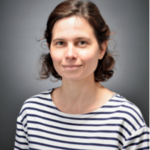 More Info
More InfoDr. Delphine Quenet
Assistant Professor, Department of Biochemistry
-
 More Info
More InfoKoela Ray, M.S.
Senior Lecturer, Medical Laboratory Science
-
 More Info
More InfoTom Wilson, M.Ed.
Community-Engaged Learning Program Coordinator
-
 More Info
More InfoLionel Beasley, M.A., M.F.A.
Lecturer, Department of English
Cost
High school students receive a 50 percent in-state/out-of-state academic year tuition reduction. Vermont residents can learn tuition-free through Vermont’s Dual Enrollment Program!
Residential Prices (living on campus)
Dual Enrollment – In-State Vermont High School Students – 2024 Price
- Deadline to request a voucher for Summer 2024 is to be announced
- Tuition – $0*
- Deposit: $300
- Comprehensive Fee – $30
- Program Fee – $2,680
- Lab Fee – See Individual Course Descriptions
* The tuition price above reflects a reduced rate through Dual Enrollment.
In-State Vermont High School Students – 2024 Price
- Tuition – $1,017
- Comprehensive Fee – $30
- Program Fee – $2,680
- Lab Fee – See Individual Course Descriptions
Out-of-State High School Students – 2024 Price
- Tuition – $2,580
- Comprehensive Fee – $30
- Program Fee – $2,680
- Lab Fee – See Individual Course Descriptions
* The tuition price above reflects a 50% savings from out-of-state academic year tuition for high school students.
Commuter Prices (Not residing on campus)
Dual Enrollment – In-State Vermont High School Students – 2024 Price
- Deadline to request a voucher for Summer 2024 to be announced
- Tuition – $0*
- Comprehensive Fee – $30
- Lab Fee – See Individual Course Descriptions
* The tuition price above reflects a reduced rate through Dual Enrollment.
In-State Vermont High School Students – 2024 Price
- Tuition – $1,017
- Comprehensive Fee – $30
- Lab Fee – See Individual Course Descriptions
* The tuition price above reflects a 50% savings from in-state academic year tuition for high school students.
Out-of-State High School Students – 2024 Price
- Tuition – $2,580
- Comprehensive Fee – $30
- Lab Fee – See Individual Course Descriptions
* The tuition price above reflects a 50% savings from out-of-state academic year tuition for high school students.
Summer Academy Financial Policies
Program Requirements: While doing the UVM Summer Academy program, the participant must be enrolled in a UVM Summer Academy course throughout the duration of the program. If the participant elects to withdraw from their course once it has started, they are required to speak with a Summer Academy Advisor. If the participant does not maintain enrollment in a Summer Academy course, the participant will be required to leave the program without refund.
Tuition: The cost of the tuition is variable based on the student’s residency status including: in state, out of state, and dual enrollment.
Cancellation & Medical Withdrawal Policy: All cancellation requests must be sent via email at learn@learn.uvm.edu. UVM tuition will be refunded based on the UVM add/drop policy deadlines. For a medical withdrawal the medical condition must be documented by a physician as one that prevents participation in the program.
Please note: The University of Vermont reserves the right to cancel any programs.
For more information and answers to common questions regarding payment see our FAQ.
Dual Enrollment
What is Dual Enrollment?
A statewide program for high school juniors and seniors, to access up to two college courses with tuition fully reimbursed through a voucher system approved by their high schools.
Voucher requests for summer courses open in mid-February, and vouchers for fall courses open in mid-April
A voucher only covers the cost of tuition (up to four credits). Students are responsible for the Comprehensive Fee and, if applicable, specific lab/studio/program fees. Please go to Tuition and Fees and refer to “**Part-Time Student Fees.”
The Cost of parking, books, and transportation to/from the University is not included.
- In addition to Summer Academy, many University of Vermont courses are available through this program including Calculus, Computer Science, Human Biology, Psychology, and English. Courses are offered during the summer and academic school year, online and on campus.
- Funding is dependent on Vermont Legislative approval.
- For more information, contact our main office: (phone) 802-656-2085 (email) learn@uvm.edu
Who’s Eligible?
High school students who are Vermont state residents are eligible for two vouchers during their junior or senior years in high school. Students are not eligible to use a voucher the summer after they have graduated from high school. Students must apply for a voucher for the semester they wish to enroll in a dual enrollment course and seek approval by their high school. Students who attend an independent high school and whose tuition is not paid for by their hometown, are not eligible for a voucher.
Program Detail
- The voucher covers the cost of tuition for up to a 4-credit course at any of the participating colleges. The voucher does not cover the costs of materials and textbooks. Some funding is available through VSAC, to help cover these additional costs, for students who are eligible for free and reduced-price lunch.
- Vouchers are awarded on a semester-by-semester basis, and unused vouchers expire every semester. (You can apply again.)
- Students must apply for a voucher whether they take a course on a college campus, online, or take a course at their high school for college credit.
- Students must get approval for a dual enrollment course from their high school to ensure they will receive high school credit. (For a voucher to pay for a college course, it must count as credit towards graduation at the student’s high school.)
- If a student changes their mind and wants to attend a different college, the student needs to apply for another voucher.
- If the student drops the course within the college or university’s published add/drop period, the voucher will not be applied, and it is available for use in a different semester.
For more information, please visit the State of Vermont Agency of Education Dual Enrollment Website. Apply for a voucher through the Vermont Agency of Education
Student Support
UVM Pre-College Enrichment Learning Community
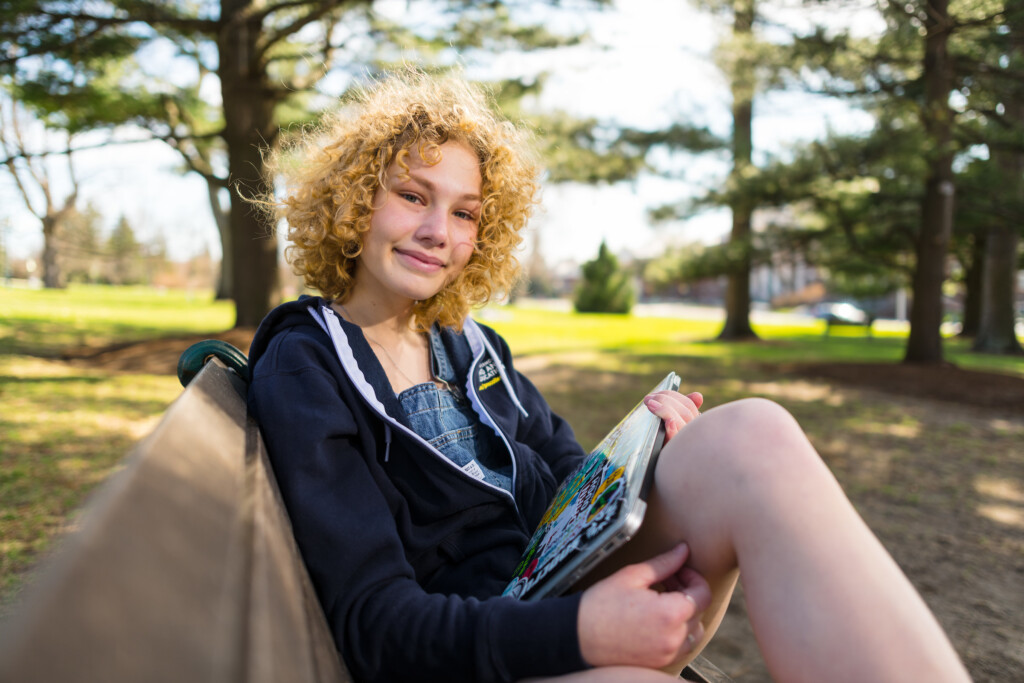
As part of your Pre-College learning experience, you will have access to the UVM Pre-College Enrichment Online Learning Community, designed as a resource to support your UVM courses. You will be part of this community to receive important information about academic updates and deadlines, develop your study and learning skills, and explore the many resources and opportunities provided through UVM and other organizations.
A peek at what is offered through the Online Learning Community:
- Orientation
- An online introduction to the Community, tech tools, and effective online learning to prepare you for your courses.
- Virtual UVM Tour
- UVM Library Access
- Connection to UVM Resources
- ADA/ACCESS accommodations
- Tutoring Center
- Undergraduate Writing Center
- Center for Health & Well-Being
Campus Living

Summer Academy students choosing to live and eat on campus are housed together for two weeks in the same residence hall.
As a part of this residential learning community, you will deepen your understanding of yourself and develop meaningful relationships. The activities planned throughout the week after class and over the weekend, and the spontaneous happenings in the hall, will help you make the most of this pre-college experience and encourage you to become more connected, engaged and successful. The Summer Academy activities listed below support the Four Cornerstones of UVM’s Department of Residential Life – Enhancing Learning, Community & Civic Engagement, Advancing Diversity & Inclusion, and Health & Wellness.
Draft SUMA 2024 Schedule (subject to change)
Enhancing Learning
- Campus Tour
- College Admissions Workshop – designed to help students prepare for their college application
Community and Civic Engagement
- Events on the Green: Circle time and Activities
- Indoor/Outdoor Games and Entertainment
Health and Wellness
- MetroRock – ropes course and climbing wall
- Burlington Farmer’s Market & Walk on Church Street
- Burlington Surf Club/Beach Activities – TBD
- VT Lake Monsters Baseball game
- Sunset cruise on the Spirit of Ethan Allen
- Spare Time – bowling and laser tag
Students do not have class on July 4 as it is an observed holiday at the University of Vermont. Students will be participating in enrichment activities on July 4.
Residential Housing
Summer Academy students will be staying in our resident halls on the UVM campus. Students are supervised 24/7 by a team consisting of a Residential Director and several Residential Assistants.
Dining Program
Summer Academy students enjoy the ease and convenience of a UVM Summer Dining Plan.
Your main dining hall will be determined as we get closer, but most everyplace on campus is within a 10 minute walk. You will have some retail points that can be used across campus at other locations and in the food stores. The dining plan included in your program fee grants you 3 meals per day, except check-in day and check-out. Check-in day there will be a BBQ mid-afternoon and check-out day breakfast will be available. Also included are a total of 40 Retail Points that students can use for other dining options across campus.
Additional Retail Points can be added to existing accounts by contacting the Meal Plan Office. Visit the University Dining Services for additional information.
FAQ
The parent/guardian agrees that the student is academically ready to try a college-level course. Parent/guardian signs approval form. Students need to be a high school rising junior, senior or recent graduate.
No. We ask that students are dropped off for their residential stay. It is a liability to our program if students have the ability to come and go. We have activities planned for the duration of the residential portion.
The University of Vermont takes the safety of its students very seriously.
On the first day we have both Police Services and the Fire Marshal come to go over fire and safety on campus.
All of our classes are on the UVM campus. The Residential Advisors (RA) and the Lead Activities Coordinator will accompany students to any on and off-campus activity. The RA’s go through a full training prior to summer programs.
Our residential program maintains strict staff and RA to student ratios of 1:10 and provides ample training to ensure students remain safe during the program.
Students are strongly encouraged to download and familiarize themselves with the LiveSafe app. UVM’s LiveSafe app is a versatile mobile two-way safety communications platform and safety tool. It provides campus community members the ability to share information with campus safety partners, including calling or messaging Police for emergency help from anywhere. It also contains a “SafeWalk” feature that allows students to select someone to virtually follow them while walking from place to place.
Please review this site for tips and information on how to recognize concerning behavior and to take action if needed. We all serve as the eyes and ears of the university when it comes to safety. If you see something, say something. It is also important to bring concerns, observations, and information directly to UVM Police Services first, so any potential threat can be assessed and necessary action can be taken.
Fire and life safety on the UVM campus:
Please review UVM’s fire and life safety initiatives here. The most important actions we can all take to keep our community safe are to recognize and report all emergencies promptly, to understand and observe the prohibited hazardous items in our residence halls and all buildings in general, and to promptly evacuate buildings when the fire alarm system activates. UVM’s Annual Fire Safety Report for Student Housing contains additional useful information to help prepare you for your stay on campus.
When registering, please provide information regarding any conditions or accommodations you/your child might require for participation in the program. We will send you information on how to connect with Student Accessibility Services.
Summer Academy dates are: July 1 – 26, 2024. July 1 – 11 courses will be in person and July 15 – 26 courses will be online. If you choose to reside on campus, check-in will be Sunday, June 30, 12-2pm and checkout will be Friday, July 12 before noon. The fully online course will run July 1 – 26
While participating in Summer Academy on-campus, students will attend academic courses the first two weeks followed by two weeks online. Students will participate in enrichment activities and off-campus excursions while living in a residence hall.
With your CatCard (which will be on your phone), you will have access to the library, the CCTA buses and you can choose to dine on campus for lunch (bring cash, card or put money on your CatCard). You can go to the gym if you are over 18 (you have to show ID), however the fitness center hours during the summer are much more limited.
As a high school student, you are enrolled with UVM Professional and Continuing Education as a non-degree student with rights and privileges to UVM resources.
Please refer to the Tuition and Fees page for detailed academic pricing. The remainder of the cost is for room, board and activities while residing on campus.
Financial aid is not available for students participating in this program and there are no scholarships available at this time. Vermont students may qualify for Dual Enrollment vouchers. High school tuition is at a discounted rate.
You will be notified via email to your UVM email address when your bill is available online. For summer courses, you will not receive a bill until mid-May. UVM does not send paper bills. Your bill will indicate your due date – please note that your bill may be due before your classes begin. Bills not paid by the due date are subject to a $250 late fee and a hold on your student record. Visit www.uvm.edu/~stdfinsv to view all bills and payment due dates. PLEASE NOTE: If someone else will be paying your bill, you have the option to set up a Proxy on your account. To do this, go to the Student Financial Services (SFS) page in your myUVM portal and select “Set Up SFS Proxy Access and Manage Authorizations.”
UVM email is UVM’s official method of contact with students and staff. It is very important that you regularly check your UVM email or forward it to another email account that you check regularly once you are registered. Once you have activated your UVM email, you can read your email via the web at mail.uvm.edu or you can access it in your myUVM portal page. Important messages from UVM, such as class cancellation notices, billing, announcements of special events, and financial aid communications will only be sent via your UVM email address. UVM professors also use email to notify you of any pre-class assignments or requirements. Billing notifications will ONLY be sent to your UVM email. It is extremely important to activate your UVM email as soon as possible and check it regularly.
For all of the Summer Academy courses you will earn 3 credits. These credits are part of your official UVM transcript.
You should plan to spend at least 25 – 30 hours per week on this class for the first two weeks. Depending on your class, this may include lectures, labs, videos, online group work, discussion board, and homework. The second two weeks online will be a final assignment and/or discussion board work, along with possible one-hour live sessions with your instructor. This will depend by course, but the online time commitment is about 10 hours per week for the final two weeks. Students find the discussion boards with fellow students and instructors to be very engaging. Your participation can take place anytime, including evenings and weekends. Residential students will participate in enrichment learning activities not included as part of the academic course.
Yes, laptops are required to participate in UVM courses. Please refer to the course syllabus or email your instructor for exact course requirements. Please be sure you have Microsoft Office or a similar word processing program on your computer so you are able to complete course homework.
Advising and Student Support
You have the goal; we’ll help you achieve it
We are dedicated to helping you access UVM. It is our role to get to know your experience and goals, assist you in choosing courses, guide you through registration, and serve as your resource throughout your time at UVM.
Curious if your past college credits apply at UVM? Want to understand where a program will take you after completion? Looking for resources for financial aid, tutors, or UVM policies? We’re here to help.
